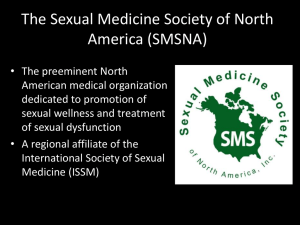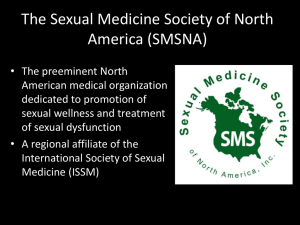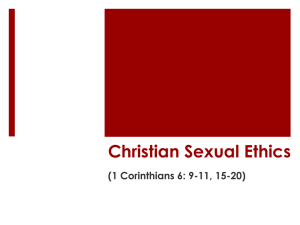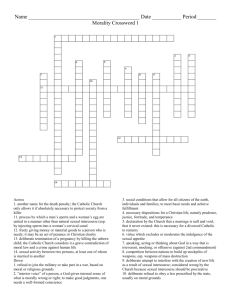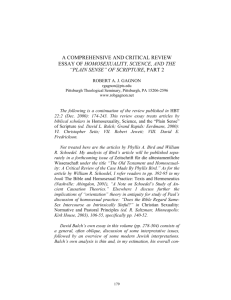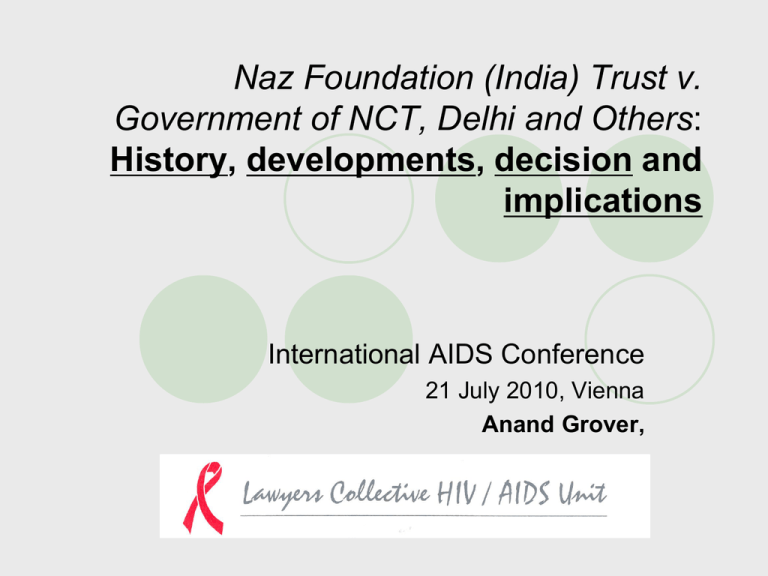
Naz Foundation (India) Trust v.
Government of NCT, Delhi and Others:
History, developments, decision and
implications
International AIDS Conference
21 July 2010, Vienna
Anand Grover,
Section 377, IPC
Whoever voluntarily has carnal
intercourse against the order of nature
with any man, woman or animal shall be
punishable with imprisonment for life, or
with imprisonment of either description
for a term which may extend to 10
years, and shall also be liable to fine.”
Explanation: Penetration is sufficient to
constitute carnal intercourse
“
Section 377, IPC
Meaning and Scope
Whoever: Man only? Till date, no female convicted for
same sex acts
Voluntarily: Distinct from consent; which is irrelevant
Carnal intercourse: Sexual acts other than penilevaginal intercourse
Offence of sodomy constitutes anal intercourse only
[Government V. Bapoji Bhatt1884 (7) Mysore LR 280, 345]
Subsequently overruled to include oral sex
[Khanu v.
Emperor, 1925 Sind 286, Lohana Vasantlal v. State, AIR 1968 Guj 252, Calvin Francis v.
Orissa, 1992 (2) Crimes 455 ]
And other penetrative acts:
Rubbing of penis between thighs [State of Kerala v. Kundumkara
Govindan, 1969 Cri LJ 818 State of Gujarat v. Bachmiya Musamiya, 1998 (3)
Guj LR 2456]
Manipulation of penis, held tightly by hands [Brother John
Antony V. State, 1992 Cri. L.J. 1352]
Section 377, IPC
Meaning and Scope
Against the order of nature:
Sexual acts w/o possibility of conception [Khanu v. Emperor 1925 Sind
286]
Imitative and perverse [Lohana Vasantlal Devchand v. State, AIR 1968 Guj 252]
Sexual perversity, deprivation of mind [Fazal Rab Choudhary v. State of
Bihar AIR 1983 SC 323, Mihir alias Bhikari Charan Sahu v State of Orrissa, (1992) 1 Crimes
1096 ]
With man, woman or animal: Applicable to homosexuals,
heterosexuals & bestiality [See Grace Jeyramani V. E. P. Peter A.I.R. 1982 Karnataka
46]
Penetration: “Since statute does not specify any particular opening
to which penetration can be made, penetration into any orifice of any
one’s body except vaginal opening of a female is sufficient for
establishment of the crime.”[State v. Bachmiya Musamiya, 1999 (3) Guj LR 2456]
The Naz challenge
Basis:
NGO engaged in sexual health promotion for men who
have sex with men (MSM)
And, Section 377:
Impedes its work
Interferes with rights of MSM
Contention: Section 377 is unconstitutional in
that it applies to private, adult, consensual sex
Prayer: Section be read down to only cover nonconsensual acts and with minors
Case developments
Nov 2001: Naz files petition in Delhi High
Court (HC)
2002: Notice issued to Govt of India;
Attorney General asked to appear
Sept 2003: Ministry of Home files affidavit
opposing petition
Sept 2004: Petition dismissed for lack of
“standing”
Nov 2004: Review petition in HC rejected
Feb 2005: Appeal filed in Supreme Court
Case developments
Apr 2006: Matter remanded back to HC
July 2006: NACO files affidavit
admitting legal hurdles in HIV
prevention with MSM
May 2008: Final arguments begin
Nov 2008: Arguments conclude
July 2009: HC pronounces verdict
Arguments for Naz
Section 377 violates Fundamental Rights:
Article 14 (Equality and Equal Protection of Law)
Vague; unjust; unreasonable
Disproportionate impact
Article 15 (Non-discrimination)
Prohibited grounds of sex includes sexual orientation
Article 19 (Freedom of speech, expression & association)
Obstructs right to receive/impart information
Forbids self-expression
Prevents organising
Article 21 (Right to Life and Liberty)
Intrusion in Privacy; w/o compelling state interest
Violates right to Dignity
Infringes right to Health (HIV arguments)
Counter arguments by Govt of India
Substantive Arguments
Article 14:
Not arbitrary; clear intent to prevent acts against nature
No disparate impact; covers heterosexual too
Article 15: Constitution does not recognise sexual orientation
and/or sexual minorities
Article 19: No hindrance to freedoms; eg: “gay parades”
Article 21:
No right to commit an offence; private/adult/consent irrelevant
Injurious to public health
Decriminalization will increase AIDS
Homosexuality is a disease
Threatens public order
Against public morality
Section 377 preserves public interest; restrictions on rights
justified
Counter arguments by Govt of India
Technical Grounds
Mere perception or abuse of law cannot
invalidate statute
Prerogative of legislature, not judiciary
Prayer for declaration is impermissible
HC decision dated 2.7.09
“We declare that Section 377 IPC,
insofar it criminalizes consensual
sexual acts of adults in private, is
violative of Articles 21, 14 and 15 of
the Constitution.”
Continue to govern non-consensual acts
and sex involving children(> 18yrs)
Advised Parliament to modify the law in
line with 172nd Law Commission Report
Highlights of decision
Firmly establishes privacy – of person, not just space or
acts, as a fundamental right
Interprets sex to also mean sexual orientation as
grounds prohibiting discrimination
Affirms “integrationist” policy; protection of rights =
promotion of public health
Rejects public disapproval as basis to restrict rights
Sets constitutional morality (principles of inclusion/
equality/plurality) as standard for compelling state
interest
And…, reconfirms Constitution as the “ultimate
protector” of rights
Implications and next steps
Applies only to Delhi?
NO, applies across India as it is a High
Court ruling on the constitutionality of a
central statute holds
Still Applies to cases:
o Between minors or adults and minors
o Between adult if not consensual
o If it is not in Private but in Public
Other cases:
Prof Siras: Gay Professor in AMU
Lessons learned
What is the injustice
Cause is just
Long term action plan
Involve the community
Get used to brick bats
Don’t expect any rewards
Reward is bitter sweet






